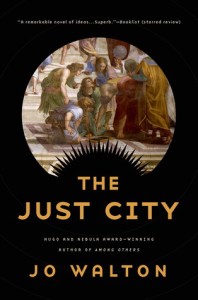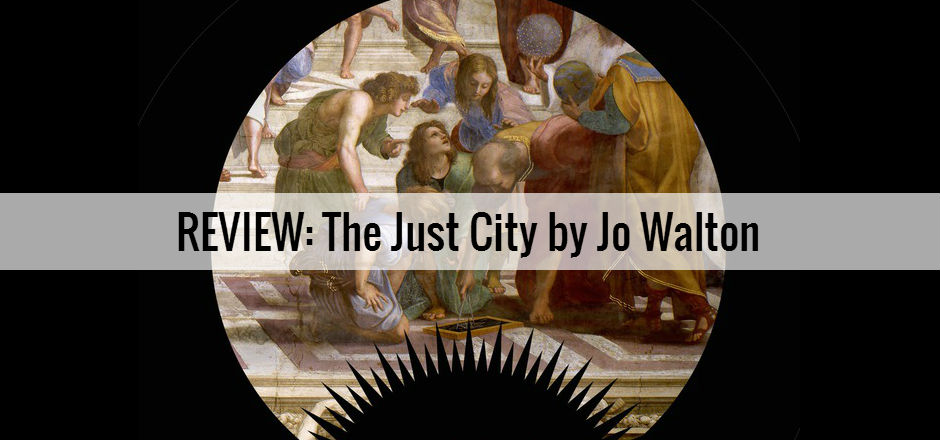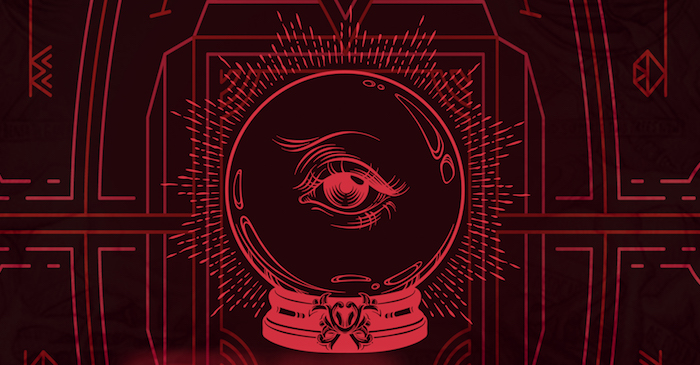After finishing up with the soul-crushing The Song of Achilles in February (the review of which you can find here), I was in the mood for some more fiction involving Greek mythos. Lo and behold, Jo Walton’s The Just City caught my eye on a list of must-read fantasy novels, and here I am, happy as ever that I picked up this book.
 The novel opens up with Apollo and Athene having a discussion about things like ‘volition,’ ‘equal significance,’ and ‘consent’ with regards to romance, things that Apollo, as a god, has a hard time understanding. He decides he wants to try being mortal as a kind of self-discovery experiment, and Athene suggests that he carry out such an experiment in her Just City, a city built on the ideals of Plato’s Republic.
The novel opens up with Apollo and Athene having a discussion about things like ‘volition,’ ‘equal significance,’ and ‘consent’ with regards to romance, things that Apollo, as a god, has a hard time understanding. He decides he wants to try being mortal as a kind of self-discovery experiment, and Athene suggests that he carry out such an experiment in her Just City, a city built on the ideals of Plato’s Republic.
That’s her experiment. And how does she carry it out? Whoever prays to her for a chance to live in Plato’s city described in the Republic, no matter what period of time they currently live in, is scooped up and deposited right there, with the intention of helping to build such a city from the ground up. These people get to help decide what buildings should be erected, what they should look like, which art from different time periods to save and salvage, what books to bring in, what to teach the children that will eventually be housed there, how to group the children together, etc. Essentially, they are the city’s founders. It’s a long, arduous process, but everyone believes that it’s worth it to bring Plato’s city to life, a city that they believe will bring out the best in humanity.
There are three points of view that we’re graced with here. There’s Simmea, who’s one of the slave-children purchased exclusively for the purpose of living and growing up in the Just City as part of Athene’s experiment. Next is Maia, a girl who grew up in the stifling Victorian era where it wasn’t proper for women to be interested in things like philosophy – she prays to Athene to be taken to the Just City and as a result becomes one of the city’s founders. And finally of course there’s Apollo, now going by the name Pytheas as a mortal, who also arrived as a child and is therefore raised and taught along with the other mortal children.
If philosophy in college had been as fun and interesting to read about as it is here in The Just City, I might’ve gotten better grades. Walton has a great way of drawing the reader into what seems like the simplest of topics and showing them, through dialogue, the different routes and avenues a conversation can take if you ask the right questions.
For example, how does a person come to trust someone? What’s a woman’s role in this society, and how do you try and convince those founders coming from earlier time periods that their perception of women as a lesser sex is wrong and outdated? You might think it’s a simple matter, but the conversation between the involved characters spans several pages, during which all of it is not only relevant but also thought-provoking.
The best part about The Just City is that Socrates (spelled ‘Sokrates’ in the novel) pops up. Yes, that Sokrates. He arrives in the Just City as a kind of observer and doesn’t hold back his commentary on what he thinks about the whole process. He’s funny and quick as a whip, almost like the kind of guy you’d want to get a beer with after work – if you don’t mind having long discussions about the intentions and morality of the Greek gods over a beer (and maybe wanting to punch him in the face from time to time). He has his own thoughts about the Just City, as well as his own criticisms, but with Walton’s skilled writing, his opinion isn’t necessarily the ‘right’ one; it’s okay for the reader to disagree with him, even as the characters sometimes do.
The Just City makes you think. It makes you look and relook and look for a third time at your own morals and virtues, and it tackles a wide range of topics – albeit, sometimes the pacing can wobble and slow down, making it difficult to get through certain scenes or chapters. The ball is dropped, in a sense, so at times it’s a little inconsistent but not enough for it to be entirely bothersome. It certainly doesn’t detract from the overall story, which is as compelling and refreshing as it can get when it comes to Greek mythology, philosophy, and history.
So Greek mythos nerds, unite! The Just City has your back.
4 out of 5 stars
—
Gabby Taub, the Fantasy Reviewer at Girls in Capes, is a recent graduate of New York University. She enjoys reading, writing, watching TV, and spending time getting lost among the bookshelves at Strand Bookstore.
Check out Gabby’s other fantasy reviews, including The Falcon Throne and Radiant.





